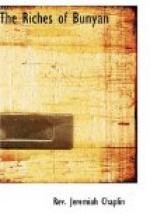Some have thought the altar to mean the cross on which the body of Christ was crucified when he gave himself an offering for sin; but they are greatly deceived, for he also himself was the altar through which he offered himself; and this is one of the treasures of wisdom which are hid in him, and of which the world and antichrist are utterly ignorant.
The altar is always greater than the gift, and since the gift was the body and soul of Christ—for so saith the scripture, “He gave himself for our sins”—the altar must be something else than a sorry bit of wood, or than the accursed tree.
Wherefore I will say to such, as one wiser than Solomon said to the Jews when they superstitiously magnified the gift, in counting it more honorable than the altar, “Ye fools and blind; for whether is greater, the gift, or the altar that sanctifieth the gift?”
If the altar be greater than the gift, and yet the gift so great a thing as the very humanity of Christ, can it—I will now direct my speech to the greatest fool—can that greater thing be the cross? Was the cross, the wooden cross, the cursed tree that some worship, greater than the gift, to wit, the sacrifice which Christ offered, when he gave himself for our sins? O idolatry! O blasphemy!
But what then was the altar?
The divine nature of Christ, that eternal Spirit, by and in the assistance of which “he offered himself without spot, to God.” “He through the eternal Spirit offered himself.”
And it must be this, because, as was said, the altar is greater than the gift; but there is nothing but Christ’s divine nature greater than his human. To be sure, a sorry bit of wood, a tree, the stock of a tree, is not.
It must be this, because the Scripture says plainly, the altar sanctifies the gift, that is, puts worth and virtue into it. But was it the tree, or the godhead of Christ, that put virtue and efficacy into this sacrifice that he offered to God for us? If thou canst but count thy fingers, judge.
Let the tree then be the tree, the sacrifice the sacrifice, and the altar the altar; and let men have a care how, in their worship, they make altars upon which, as they pretend, they offer the body of Christ; and let them leave off foolishly to doat upon wood and the works of their hands.
XXIV. DEATH.
Seeing man was taken from the ground, he is neither God nor angel, hut a poor earthen vessel, such as God can easily knock in pieces and cause to return to the ground again.
And the time of need is the day of death, when I am to pack up all to be gone from hence, the way of all the earth. Now the greatest trial is come, except that of the day of judgment. Now a man is to he stripped of all but that which cannot be shaken. Now a man grows near the borders of eternity. Now he begins to see into the skirts of the next world. Now death is death, and the grave the grave indeed. Now he begins to see what it is for soul and body to part, and what to go and appear before God. Now the dark entry and the thoughts of what is in the way from a death-bed to the gate of the holy heaven, come nearer the heart than when health and prosperity do compass a man about.




